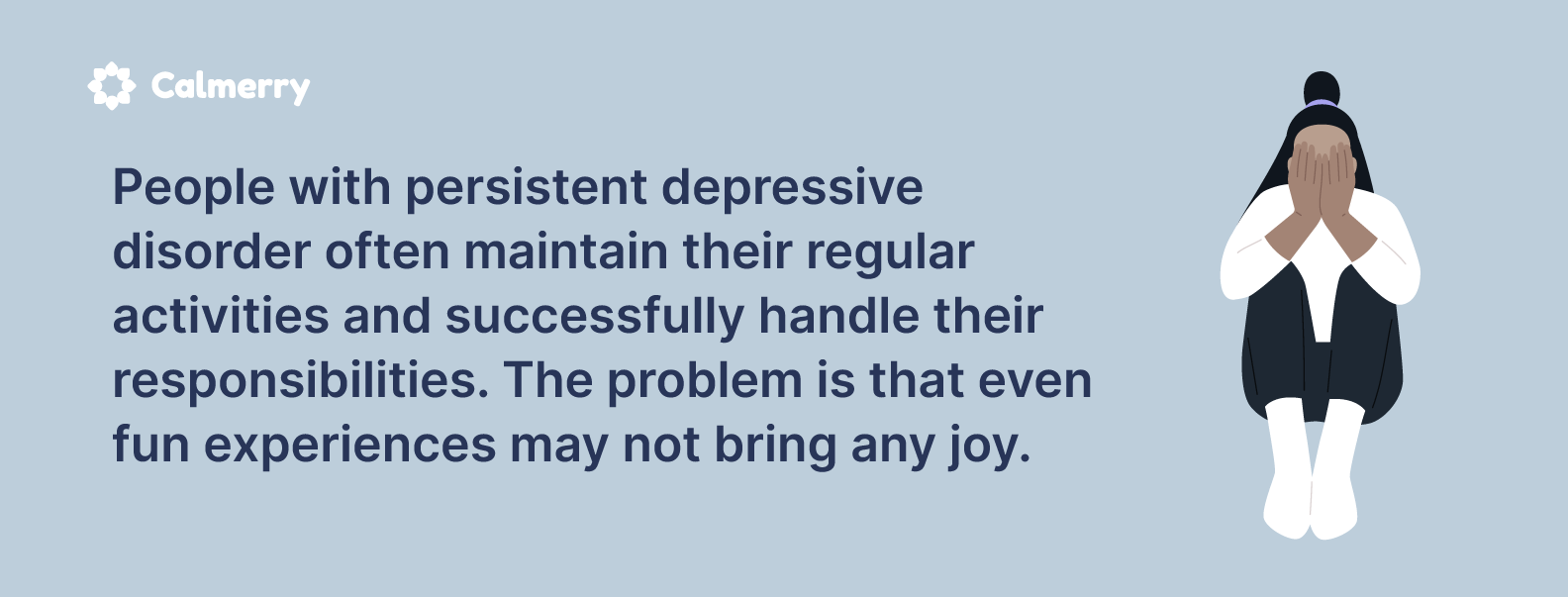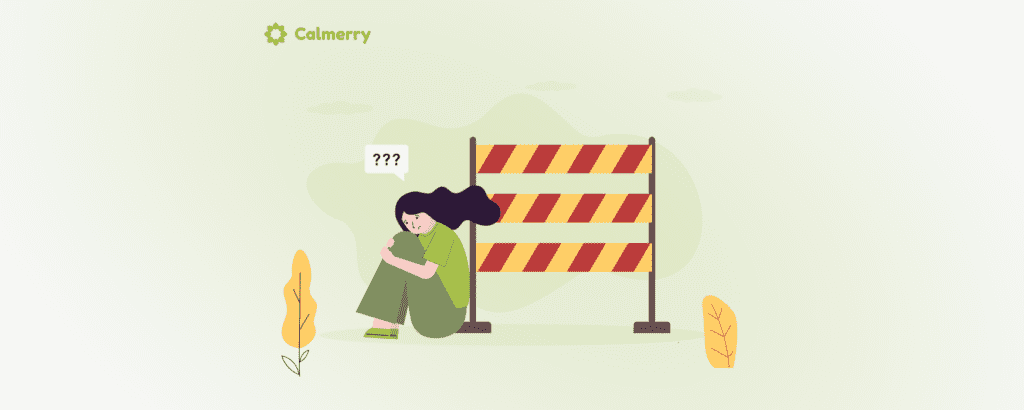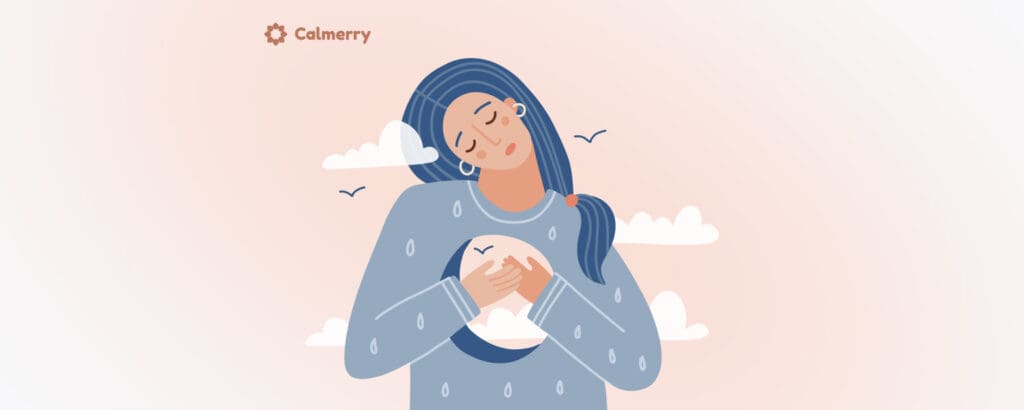Why Do I Feel Sad for No Reason, and What Should I Do?

In this article
Our mood may change depending on countless factors. Emotions are a response to our environment, thoughts, and experiences, so they cannot be static — there will always be ups and downs.
Even though all of us would like to always be happy and joyful, it’s virtually impossible for a human being to stay positive constantly.
Sadness is a part of life, one of the basic emotions that we all feel from time to time. Most often, we feel sad when we are disappointed, hurt, or frustrated.
Everyone has many reasons to be sad, and when we’re feeling low, we usually know exactly what ruined our mood.
However, sometimes, people feel like their sadness came out of nowhere.
What to do when you feel sad for no reason? The main thing is to keep in mind that a feeling of relief usually follows sadness. Just like any other emotion, sadness won’t last forever, so don’t be afraid to acknowledge and validate your emotions.
Even though sadness is a negative emotion, it’s healthy, and sometimes it may be helpful.

Sometimes, sadness can help you reevaluate relationships with others and reconsider priorities.
If you’re feeling sad, that doesn’t mean that you’re not coping with a problem — it may simply mean that you need some time to process the situation and adapt to it.
In this article, we will consider sadness in more detail, explore the connection between sadness and mental health, and think of what can cause negative thoughts and feelings.
Understanding sadness
Everyone experiences sadness differently. For example, sadness can be accompanied by general unhappiness, anger, guilt, anxiety, or distress. The way you feel when you’re sad directly depends on the situation that triggered this emotion, as well as your perspective and interpretation.
Sometimes, these other feelings can be much stronger, so you may not even realize that you’re sad. Besides, sadness can manifest itself not only emotionally but also physically.
For instance, you may have headaches or sleep problems.
Sadness may also affect people’s behavior. When we feel sad, we may avoid social interactions or act defensively around others.
Sadness can also lead to a loss of motivation, affecting a person’s productivity and professional performance.
Why do we feel sad?
There are millions of possible situations that can make someone feel sad.
Here are just a few common potential causes of sadness, some of which may look familiar to you:
- A breakup
- A divorce
- Loneliness
- Problems at work
- Chronic, overwhelming stress
- Problems with health
- Major life changes
- A loss of a loved one
- Hormonal changes caused by puberty, menopause, drugs, or medications
- Lack of quality sleep
- Seasonal sadness
- Unhelpful thinking patterns, including self-criticism or focusing on the worst-case scenarios
Any of the examples above can create a lot of room for negative thoughts, and these thoughts can, in turn, make you feel worse.
Therefore, it’s important to keep in mind that sadness itself isn’t bad.
There’s nothing wrong with you; you just have to acknowledge this feeling and take some time to cope with it.
Is it normal to feel sad and not know why?
If you’re feeling down and cannot figure out why, it may feel weird. However, you should keep in mind that it’s completely normal to feel sad without knowing the reason.
Some people may note that their mood declines when it rains outside, while others may feel sad because of negative memories that they try to ignore.
Understanding the reason behind your feelings allows you to take specific steps to improve your mood and overall well-being.
If you’re feeling low for no apparent reason, you can figure out what made you upset by working with a therapist. Sometimes, we just need to dedicate more time to self-reflection and pay more attention to details.
Talk therapy allows you to spot unhelpful thoughts that trigger negative feelings so that you can challenge them and regain control over your emotions.
Depression vs. sadness
Depression is one of the most common mental health problems, with 3.8% of the world population affected by it. [1] World Health Organization: WHO & World Health Organization: WHO. (2023, March 31). Depressive disorder (depression). https://www.who.int/news-room/fact-sheets/detail/depression While sadness affects everyone — it’s an emotion, not a disorder.
So, if you find yourself feeling low, that doesn’t mean that you necessarily have depression. Perhaps, these lasting feelings of sadness may be caused by an imbalance of serotonin, a hormone that affects mood regulation.
Nevertheless, you should never rule out such a possibility of experiencing depression.
Sadness is one of the typical depression symptoms. As a symptom, it lasts longer than usual. People with major depressive disorder may feel down almost every day for at least 2 weeks.
It might also be accompanied by a number of other symptoms, like:
- Having too little energy and motivation for everyday functioning
- Feeling sad, overwhelmed, or anxious
- Crying frequently
- Mood swings
- Aches, stomach problems, physical tension
- A loss of appetite
- Difficulty sleeping
- Feeling empty or hopeless
- Having problems with concentration
- Getting angry or irritated over minor things
For people with depressive symptoms, sadness can become an almost constant feeling. Moreover, severe depression is a clear cause of intensive sadness, which leads to a strong, persistent feeling of hopelessness and suicidal thoughts.
If you think about self-harm, please immediately call or text the National Suicide and Crisis Lifeline at 988.
Are people with depression always sad?
There is a common opinion that people with mental health disorders, like depression, are always sad and never look happy. The truth is that it’s no more than a misconception.
The Diagnostic and Statistical Manual of Mental Disorders (DSM-5) describes many types of depression. Most often, people experience episodes of depression that last for a few weeks or longer.
Once an episode is over, a person may not feel sad or have any other symptoms.
Also, depression can take a form of persistent depressive disorder (PDD), more commonly known as dysthymia. This disorder doesn’t let you take a break in between episodes. In this case, symptoms of depression may last for years.
The symptoms, however, may not have the same disruptive impact on one’s life as when dealing with major depressive disorder.

People with dysthymia may hold a generally negative attitude. Besides, this disorder may lead to low self-esteem and a lack of motivation.
Postpartum depression
If you keep asking yourself, “Why do I feel low for no reason?” and your sadness doesn’t seem to ease with time, the best solution is to take a depression test and discuss the results with a primary care doctor or a licensed therapist.
A therapist can suggest some coping strategies that might help you if you feel sad for no apparent reason.
What conditions can lead to constantly feeling sad?
Depression isn’t the only mental health issue that can make you feel sad.
Here are some other common reasons why people experience sadness without any obvious reasons.
Bipolar disorder
Sadness can also be a result of bipolar disorder. In this case, sadness caused by depressive episodes is followed by episodes of mania when a person experiences an intense feeling of happiness or even euphoria.
Changes in mood usually happen quickly, with both depressive and manic episodes lasting for a week or longer.
Seasonal affective disorder
Some people may also feel down around the same time, like in fall and winter. If the weather triggers a strong and persistent sadness, it can be a sign of seasonal affective disorder (SAD).
In this case, sadness isn’t necessarily related to depression or any other mental health problems. For instance, sometimes, it is rooted in physical health.
Hormonal changes
Sadness is a common symptom of premenstrual syndrome and premenstrual dysphoric disorder (PMDD). As to peer-reviewed studies, about 48% of women in their reproductive age experience its symptoms which may vary in severity. [2] Gudipally, P. R., & Sharma, G. K. (2023, July 17). Premenstrual syndrome. StatPearls – NCBI Bookshelf. https://www.ncbi.nlm.nih.gov/books/NBK560698/ The reason why the menstrual cycle may affect your mood is that your hormonal balance changes.
The American Psychiatric Association defines PMDD as a severe form of premenstrual syndrome that may lead not only to feelings of sadness but to depression and anxiety.
For the same reason, many women develop symptoms of depression during perimenopause, a transitional period before menopause.
Drugs and medications
Sadness can also be related to drug use. It’s a common symptom of withdrawal, but it’s not always caused by the use of illegal substances — it can also be a side effect when taking various kinds of medication.
For instance, many women who use hormonal birth control pills report having symptoms of depression, including sadness.
What to do when you feel sad for no reason? Tips to boost your mood
It can be hard to understand and process why these feelings come up, especially since they may be related to past experiences or emotional events.
And there are some gentle steps you can take to cope with your feelings and move toward self-healing:
1. First, acknowledge your feelings
The first step to coping with feeling sad for no reason is to acknowledge your feelings, validate, and accept them without judgment.
Take a moment and check in with yourself – it’s important to understand that there’s nothing wrong with you for feeling this way.
Sadness is a natural emotion that everyone experiences at times.
Instead of judging yourself for feeling blue, try to figure out what kind of activities or routines might help lift your spirits. And explore what can help you increase your self-awareness, getting to the root of your emotions.
2. Do something you enjoy
Doing something you enjoy – whether it’s reading, playing games, investing time in a creative interest of yours, watching a movie, going for a walk, or listening to music – can boost your mood and take your mind off of whatever is causing you to feel sad.
Allow yourself to enjoy whatever activity you choose as an act of self-care to be able to work through the emotions you’re experiencing.
3. Talk to someone you trust
Talking to someone you trust – whether it’s a friend, family member, or therapist – can be a great way to start feeling better. When you talk about how you’re feeling, you can get help by putting things into perspective and making them seem less daunting.
Additionally, simply knowing that someone else is there for you can be a huge source of comfort.
4. Write down your thoughts and feelings
Writing down your thoughts and feelings can be a helpful way of dealing with them. Putting your thoughts into words through journaling can help you make sense of them and see them in a different light. Additionally, writing can be therapeutic and provide a much-needed outlet for your emotions.
5. Minimize stress
Feeling stressed is inevitable, especially when you’ve gone through a terrible or traumatic ordeal. When you’re stressed, your body will start producing the hormone cortisol.
This hormone is beneficial in the short-term because it allows you to cope with the stress-triggering situation.
However, if you allow the stress to overwhelm you, you can easily fall into depression. In turn, depression may become so severe that it leads to post-traumatic stress disorder, which can complicate your well-being even more.
To prevent stress from pushing you into a depressive state, find ways to minimize your stress.
6. Discover ways to bring laughter into your life
When things are tough, there is always a way out – laughter is one such way.
Laughter can help you overcome a low mood by lifting your spirits and making you feel happier. When you laugh, your brain releases endorphins, improving your mood and reducing stress.
For example, watching a funny movie, reading a humorous book, or spending time with a friend who makes you laugh can brighten your days to heal.
Allow yourself the time and space necessary to work through your feelings of sadness in whatever way works best for you.
7. Engage in physical activity
Exercises can be another way to reduce feelings of sadness and boost your mood. When you engage in physical activity, like jogging, swimming, or playing tennis, your body releases endorphins that improve your mood.
Physical activity also improves sleep and reduces stress, so you can rest better. In turn, this will improve your overall well-being and decrease sadness.
8. Listen to music
Music can be a distraction and help you clear your mind. It can also bring back pleasant memories that you can mentally return to and feel warmth and happiness.
Listening to music helps release dopamine, a “happy hormone,” that boosts your mood. Besides, dancing or singing to favourite music will increase your energy levels and improve your well-being.
9. Practice self-compassion
It can be hard to pull yourself together when things are tough, so don’t blame yourself if it takes a bit longer to get over sad feelings.
When you’re feeling sad for no obvious reason, it’s important to dedicate some time to yourself and practice self-compassion. This practice will help you treat yourself with kindness.
Self-acceptance techniques like journaling, meditation, and positive affirmations will help you prevent negative self-talk and find some relief.
10. Give yourself time
It’s important to give yourself time to heal. Just as it takes time for physical wounds to heal, emotional wounds need time as well.
Allow yourself the time and space necessary to work through your feelings in whatever way works best for you.
FAQ
What causes sadness without an apparent reason?
If you feel low and don’t see any reason behind these feelings, they may be provoked by factors like lack of quality sleep, changes in weather, problems with health, hormonal changes, or mental health conditions.
Is it normal to feel sad for no obvious reason?
Yes, it is totally okay to feel sad for no apparent reason. Sadness is one of the basic emotions that is an integral part of life. There are many reasons for these feelings, such as stress, life changes, or health problems.
It is important to find out causes and coping tips to manage sadness and to feel upbeat.
How do hormones affect unexplained sadness?
Hormone spikes during premenstrual periods, menstruation, or menopause affect our mood, and that’s why we may experience sadness.
Could this feeling be a sign of depression or another mental health condition?
Feeling low may be a sign of a mental health condition. Experiencing symptoms of a mental health condition, such as changes in sleep, appetite, or energy levels may be a signal of depression or anxiety.
If you perceive sad feelings, you should not wait until it leads to more severe problems, as mental health conditions can cause further emotional distress.
How do stress and exhaustion contribute to sudden sadness?
Due to high levels of stress and exhaustion, you may not notice pleasant moments. Stress triggers the production of cortisol, which makes you more vulnerable and can make you upset even over trivial things.
Can diet and lifestyle affect unexplained emotions?
If your body lacks essential vitamins and minerals, such as omega, iron, and vitamin D3, you may feel a lack of energy, which leads to feelings of sadness. On a similar note, if you lead a passive lifestyle, do not exercise, and do not spend time outdoors, your body is unable to produce endorphins, which are necessary for feeling good.
How do you identify triggers for sadness?
Actually, anything can be a trigger for sadness. Relationship problems, a lack of support, memories from the past, or specific events that upset you can negatively affect your mood.
What are effective coping strategies for this feeling?
To overcome feelings of despair, you can engage in physical activity, go for a walk, listen to music, read a book, or talk to someone you’re close with. Also, you can seek treatment and support from a mental health professional.
When should you seek professional help for unexplained sadness?
You should seek mental health support when the feelings of sadness don’t stop for about two weeks or when they start to disturb your everyday life. Licensed professionals are important as they provide support by helping us process difficult events and learn strategies to cope with sadness.
Sadness, if left unaddressed, may lead to more serious issues like depression and anxiety. If this is the case and you feel depressed, don’t hesitate to reach for help.
Are there any mindfulness techniques to manage such emotions?
One mindfulness technique to manage sadness is meditation and focused breathing. You may also find relief in self-kindness and grounding exercises. They will help you hear your inner self and manage difficult emotions.
Final thoughts

If you’re feeling low, you should remember that this feeling won’t last forever. Sadness doesn’t necessarily mean that you’re depressed — you may just need some time to reflect on your feelings.
You can better understand what factors make you feel down by practicing self-awareness. And don’t forget about self-compassion — there’s nothing wrong with being upset.
It’s impossible for a human being to always feel happy and joyful. However, sometimes, there is no clear reason or cause of your sadness.
If you suddenly feel low for no reason, don’t hesitate to seek professional help and talk to a therapist at Calmerry. People feel sad for different reasons, and speaking with a mental health professional can help you find out what exactly could trigger changes in your mood.
They can also suggest effective practices for primary care so that you can regain control over your emotions.
World Health Organization: WHO & World Health Organization: WHO. (2023, March 31). Depressive disorder (depression). https://www.who.int/news-room/fact-sheets/detail/depression
Gudipally, P. R., & Sharma, G. K. (2023, July 17). Premenstrual syndrome. StatPearls – NCBI Bookshelf. https://www.ncbi.nlm.nih.gov/books/NBK560698/
online therapy
live video session



